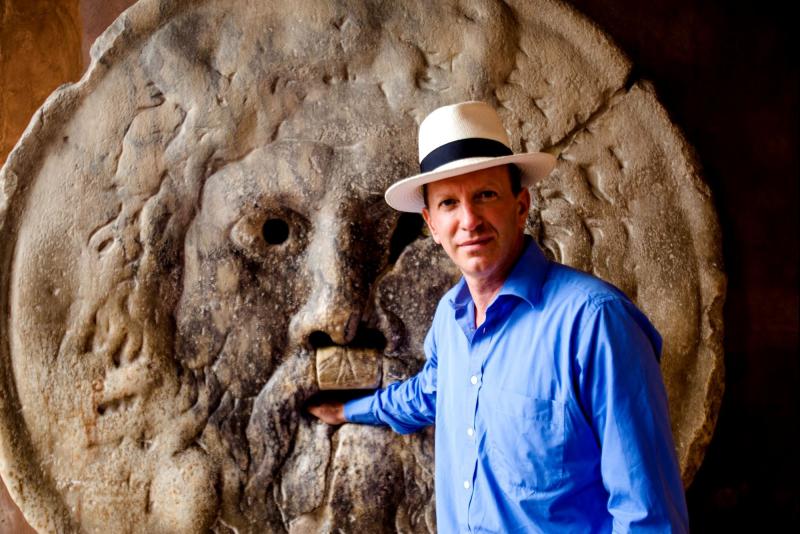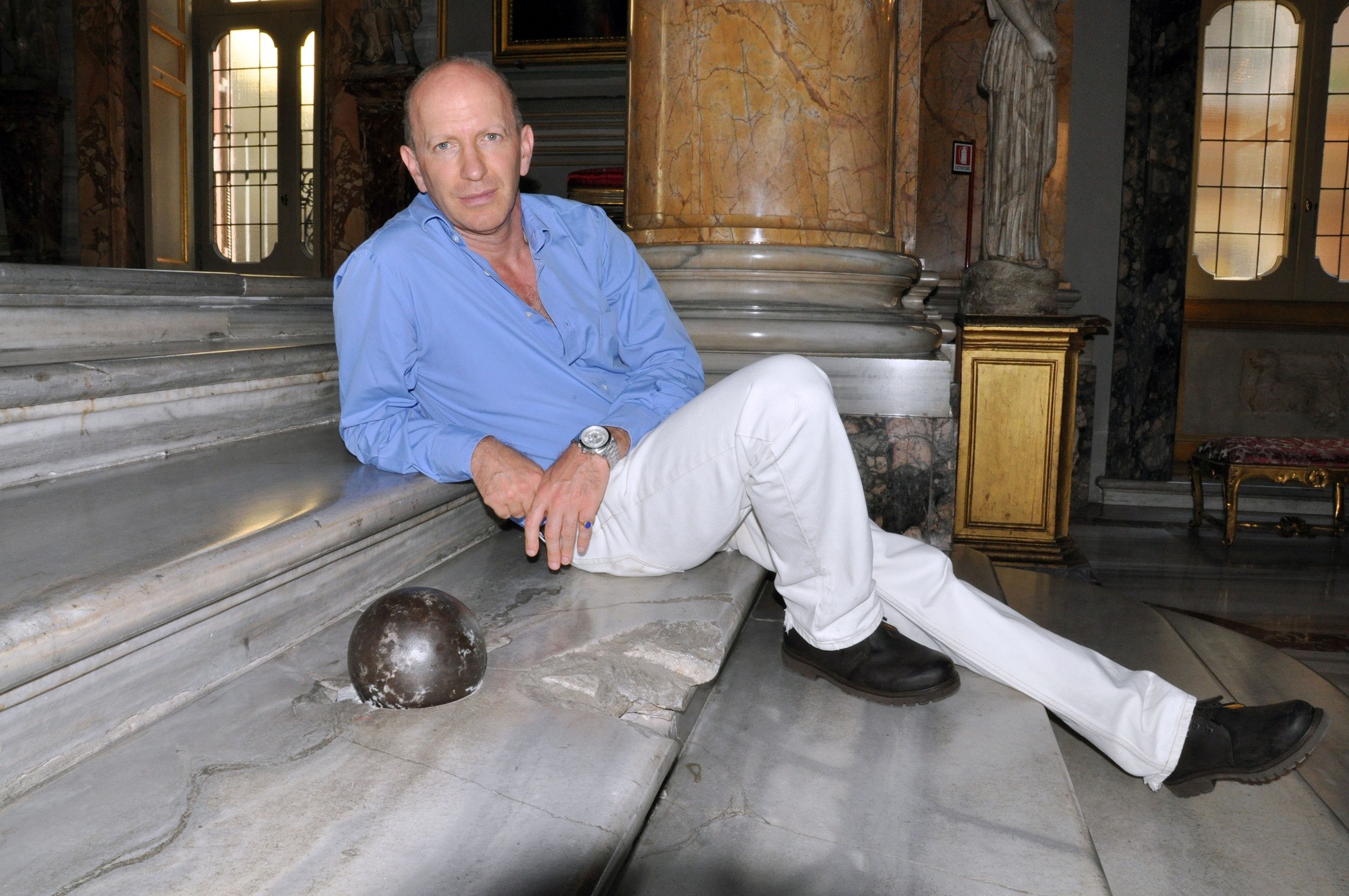Rome - A History of The Eternal City, BBC Four | reviews, news & interviews
Rome - A History of The Eternal City, BBC Four
Rome - A History of The Eternal City, BBC Four
This speedy journey around Rome has presenter Simon Sebag Montefiore on the hoof

Simon Sebag Montefiore is a historian in a hurry - as well he might be when there’s a whole millennium to fit into an hour. A year ago we had his three-parter Jerusalem - The Making of a Holy City, now we’re well into Rome - A History of The Eternal City: no mean feat, given that these are major, impeccably researched and made projects.
Rome - or at least, things loosely Roman - has been cropping up a fair amount recently. The BBC at the Coliseum again? Welcome back, signore. Sunday's Rome’s Lost Empire had Dan Snow getting up to all sorts of energetic things and proving why that one went out on One. Next week Montefiore is moving into the Dark Ages, which just happens to be the title of the current four-parter from another redoubtable Four-er, Waldemar Januszczak (who's at the opposite end of the sartorial spectrum, presenting the whole thing in rather ghoulish black).
No hours-long banquets here, and there’s little largo in the soundtrack
Montefiore describes himself as both a historian and a tourist, but it’s the former role that dominates (Kenneth Clarke rests undisturbed, though). Rome may be the city of la dolce vita, but he’s wearing out the shoe leather here on steps Palatine and Spanish to challenge any Japanese tour group – and delivering his pieces to camera admirably without a stumble on the forum's uneven floor.
Any hint at slacking is rather charmingly dictated by narrative - when he flags down a taxi it's alluding (I think) to fleeing citizens, while grabbing a pizza slice has something to do with hungry hordes. No hours-long banquets here, and there’s little largo in the soundtrack, either (he gets a lie-down, with a cannonball, in part three, though, pictured below right, BBC/Nick Holden-Sim). It’s all happily summery, until historical storm clouds loom and thunder-and-lightning shots duly darken the screen. That's except for a rather gimmicky stunt at the end of part two to convey impending historical upheaval, when they set light to a car and get the fire brigade in to put it out (a thing of budgets past, you’d have thought?).
 It’s not just knowledge and conveying a sense of being there that define these BBC Four presenter-led series, but the intonations used to convey it all - the attempts to express how really fascinating it is, as well as a bit, er, strange.
It’s not just knowledge and conveying a sense of being there that define these BBC Four presenter-led series, but the intonations used to convey it all - the attempts to express how really fascinating it is, as well as a bit, er, strange.
Montefiore's from the less-is-more school, engaged drollery and mild surprise his notes of choice, and there’s no adventure for adventure’s sake. The nearest we get is a wander through the sewers (still very much functioning) that’s justified in showing the importance of those cloacal regions in ancient city planning. What might have induced a whole string of “wows” in a different host has Sebag admitting only to a half-hour panic attack (spare your thoughts, actually, for the cameraman who managed to film his subject from the other side of what must have been a crowded ladder). Similarly he observes with detachment the “intense passionate devotion” of believers kneeing their way up the Scala Sancta, the staircase supposedly from the palace of Pontius Pilate brought back to adorn the newly-Christian capital: others would surely have been down on their popliteals before we could say “divine intercession”.
 The format's weakness is that our journey though history becomes a bit like speed chess, making the points where the narration halts for a breather the significant ones. We get the traditional intrigues of statecraft and the nuances of religion(s) here, through familiar figures like the (frequently bad) emperors and good guys like the reticent Gregory, who was lured back from his monastic cell to extend Christianity to the corners of the empire. But few could honestly say they’d heard of Marozia, a highly distinctive member of a 10th-century “tribe of sex-mad megalomaniacs” (looking remarkably innocent, left). She seems to have bedded most of the popes and royals of her day, and apparently gave rise to the word “pornocracy”. We’ve already had Julius Caesar described as a “balding adulterer”. Any guesses how the final episode of this Roman saga will end next week?
The format's weakness is that our journey though history becomes a bit like speed chess, making the points where the narration halts for a breather the significant ones. We get the traditional intrigues of statecraft and the nuances of religion(s) here, through familiar figures like the (frequently bad) emperors and good guys like the reticent Gregory, who was lured back from his monastic cell to extend Christianity to the corners of the empire. But few could honestly say they’d heard of Marozia, a highly distinctive member of a 10th-century “tribe of sex-mad megalomaniacs” (looking remarkably innocent, left). She seems to have bedded most of the popes and royals of her day, and apparently gave rise to the word “pornocracy”. We’ve already had Julius Caesar described as a “balding adulterer”. Any guesses how the final episode of this Roman saga will end next week?
Add comment
The future of Arts Journalism
You can stop theartsdesk.com closing!
We urgently need financing to survive. Our fundraising drive has thus far raised £49,000 but we need to reach £100,000 or we will be forced to close. Please contribute here: https://gofund.me/c3f6033d
And if you can forward this information to anyone who might assist, we’d be grateful.

Subscribe to theartsdesk.com
Thank you for continuing to read our work on theartsdesk.com. For unlimited access to every article in its entirety, including our archive of more than 15,000 pieces, we're asking for £5 per month or £40 per year. We feel it's a very good deal, and hope you do too.
To take a subscription now simply click here.
And if you're looking for that extra gift for a friend or family member, why not treat them to a theartsdesk.com gift subscription?
more TV
 Slow Horses, Series 5, Apple TV+ review - terror, trauma and impeccable comic timing
Jackson Lamb's band of MI5 misfits continues to fascinate and amuse
Slow Horses, Series 5, Apple TV+ review - terror, trauma and impeccable comic timing
Jackson Lamb's band of MI5 misfits continues to fascinate and amuse
 Coldwater, ITV1 review - horror and black comedy in the Highlands
Superb cast lights up David Ireland's cunning thriller
Coldwater, ITV1 review - horror and black comedy in the Highlands
Superb cast lights up David Ireland's cunning thriller
 Blu-ray: The Sweeney - Series One
Influential and entertaining 1970s police drama, handsomely restored
Blu-ray: The Sweeney - Series One
Influential and entertaining 1970s police drama, handsomely restored
 I Fought the Law, ITVX review - how an 800-year-old law was challenged and changed
Sheridan Smith's raw performance dominates ITV's new docudrama about injustice
I Fought the Law, ITVX review - how an 800-year-old law was challenged and changed
Sheridan Smith's raw performance dominates ITV's new docudrama about injustice
 The Paper, Sky Max review - a spinoff of the US Office worth waiting 20 years for
Perfectly judged recycling of the original's key elements, with a star turn at its heart
The Paper, Sky Max review - a spinoff of the US Office worth waiting 20 years for
Perfectly judged recycling of the original's key elements, with a star turn at its heart
 The Guest, BBC One review - be careful what you wish for
A terrific Eve Myles stars in addictive Welsh mystery
The Guest, BBC One review - be careful what you wish for
A terrific Eve Myles stars in addictive Welsh mystery
 theartsdesk Q&A: Suranne Jones on 'Hostage', power pants and politics
The star and producer talks about taking on the role of Prime Minister, wearing high heels and living in the public eye
theartsdesk Q&A: Suranne Jones on 'Hostage', power pants and politics
The star and producer talks about taking on the role of Prime Minister, wearing high heels and living in the public eye
 King & Conqueror, BBC One review - not many kicks in 1066
Turgid medieval drama leaves viewers in the dark
King & Conqueror, BBC One review - not many kicks in 1066
Turgid medieval drama leaves viewers in the dark
 Hostage, Netflix review - entente not-too-cordiale
Suranne Jones and Julie Delpy cross swords in confused political drama
Hostage, Netflix review - entente not-too-cordiale
Suranne Jones and Julie Delpy cross swords in confused political drama
 In Flight, Channel 4 review - drugs, thugs and Bulgarian gangsters
Katherine Kelly's flight attendant is battling a sea of troubles
In Flight, Channel 4 review - drugs, thugs and Bulgarian gangsters
Katherine Kelly's flight attendant is battling a sea of troubles
 Alien: Earth, Disney+ review - was this interstellar journey really necessary?
Noah Hawley's lavish sci-fi series brings Ridley Scott's monster back home
Alien: Earth, Disney+ review - was this interstellar journey really necessary?
Noah Hawley's lavish sci-fi series brings Ridley Scott's monster back home
 The Count of Monte Cristo, U&Drama review - silly telly for the silly season
Umpteenth incarnation of the Alexandre Dumas novel is no better than it should be
The Count of Monte Cristo, U&Drama review - silly telly for the silly season
Umpteenth incarnation of the Alexandre Dumas novel is no better than it should be

Comments
Sebag Montefiore's "Rome"
Hey thanks anon i love the
Hey thanks anon i love the music & wanted to know what it was. This series is pure joy for me & the music is an extra layer of pleasure :-)